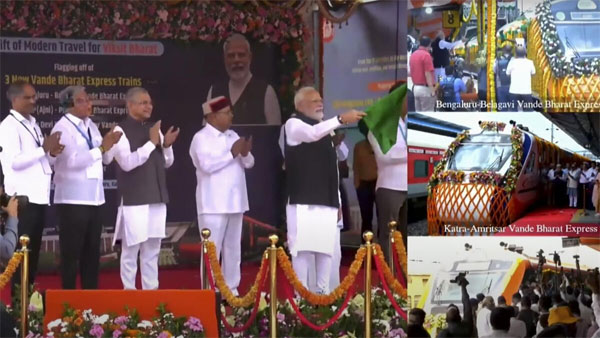Daijiworld Media Network - New Delhi
New Delhi, Aug 10: In a significant development for Jammu & Kashmir’s connectivity and economy, Prime Minister Narendra Modi virtually flagged off the Amritsar–Shri Mata Vaishno Devi Katra Vande Bharat Express on Sunday, marking a major milestone in rail infrastructure and pilgrimage accessibility.
Union Minister of State Dr. Jitendra Singh hailed the event as historic, attributing the transformational shift in J&K’s connectivity to PM Modi's leadership. He said the new train service would significantly ease travel for lakhs of devotees visiting the revered Mata Vaishno Devi shrine in Katra from across the country.

J&K Lieutenant Governor Manoj Sinha also expressed gratitude, stating, “The new Vande Bharat train will not only facilitate seamless travel for pilgrims but will also fuel economic growth in the region.” He pointed to the overall rapid growth in J&K’s railway infrastructure, highlighting Saturday’s landmark arrival of the first freight train in Anantnag from Punjab as a game-changer for Valley trade.
Vande Bharat Route and Schedule
The new Vande Bharat Express will depart from Katra at 6:40 a.m., reaching Amritsar by 12:20 p.m. The return journey will begin at 4:25 p.m., reaching Katra by 10:00 p.m. The train will operate six days a week, with Tuesday as a non-operational day.
Currently, Vande Bharat service already connects Katra to Baramulla, and plans are in place to extend this modern train service to Jammu railway station before the end of the year, offering greater convenience and faster travel for both residents and tourists.
Freight Trains Enter Kashmir: A New Era for Trade
Saturday also saw a major logistical leap for Kashmir’s economy, with the arrival of the first freight train carrying cement into Anantnag from Punjab. This development is expected to dramatically reduce transportation costs, especially for essential goods and construction materials, by providing a more stable alternative to the often-blocked Jammu-Srinagar highway.
Due to frequent landslides and weather-related disruptions on the highway, perishable goods like fruits, vegetables, and poultry often suffer costly delays. With freight trains now operational 24/7, such supply chain challenges are expected to ease substantially.
The Valley's horticulture sector — particularly its apple industry, the backbone of Kashmir’s economy — is poised to benefit immensely from this rail connectivity, which promises faster, more reliable, and cheaper logistics.
Together, these rail developments mark a new chapter for Jammu & Kashmir’s economic and spiritual landscape, seamlessly linking places of faith and trade with the rest of India.